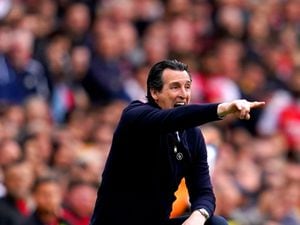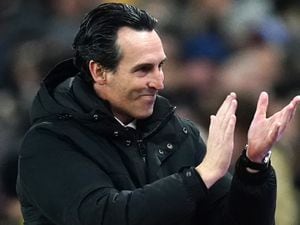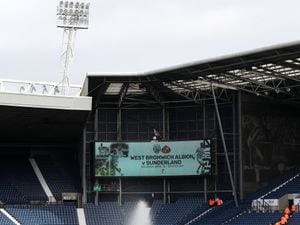Monday Analysis: John McGinn stars as optimism continues to build at Aston Villa
They might have left it late and the performance was a long way from perfect, yet there can no disguising the rising confidence in Villa as their improbable resurrection rumbles on.
What began a little more than three weeks ago with the arrival of new majority shareholders Nassef Sawiris and Wes Edens, continued on Saturday as Birkir Bjarnason’s last-gasp winner completed the club’s best opening week to a season since the days when John Gregory prowled the technical area.
You have to go back to 1999 to find the last time Villa began a league campaign with back-to-back victories and though Steve Bruce, the current boss, was honest enough to admit big improvements are still needed, the positives still vastly outweigh the negatives.
Villa have as many points on the board after two games as they did after six a year ago, when a slow start would ultimately cost them in the race for automatic promotion.
For the second time in six days, meanwhile, they passed a test of character, battling back from a losing position to take victory, something which happened only twice in the whole of last season.
Who would dare to predict all that just a month ago, when the club stood just days from administration and looked destined to lose the likes of James Chester, Jack Grealish and Jonathan Kodjia on the cheap?
Chester got the ball rolling on Saturday when he headed Villa into a 13th-minute lead, while Grealish indicated there is unlikely to be any hangover from his own fraught summer with a typically-committed display.
Yet while it was the 22-year-old whose name was chanted by supporters at kick-off, the performance of the man alongside him was what had them talking as they filed out at the final whistle.
One afternoon does not make a career, but on Saturday’s evidence, John McGinn could well turn out to be Villa’s most significant signing for many years, or at the very least the biggest bargain.
‘Grand larceny’ was how one seasoned radio commentator chose to describe the £2.75million fee paid to Hibernian for the Scotland international after witnessing his Villa Park bow.
It wasn’t merely the fact McGinn had a direct hand in the home side’s first two goals, delivering the free-kick for Chester to convert and then the corner which ended with Chey Dunkley putting through his own net, after Wigan had hit back to lead 2-1. Even more encouraging was his non-stop running and tenacity in the tackle during an all-action display, which suggested he may well be the box-to-box midfielder Villa have been missing since the day James Milner headed north to Manchester City this month eight years ago.
The 23-year-old set the tone for the day in just the second minute when he charged down an attempted clearance and then whipped in a dangerous low cross which Wigan goalkeeper Christian Walton was unable to hold at the first attempt.
McGinn would later send Walton sprawling to his left to parry a fiercely struck shot and though the debut goal did not arrive, it was already clear to see how Villa are going to be a stronger team for having him in it.
His arrival is significant because as brilliant as Grealish was over the second half of last season, opponents had come to realise if they stopped him they would go a long way to neutralising Villa’s creative threat.
McGinn provides a much-needed added dimension. Opponents may well find a way to stop either him or Grealish, yet they are going to have a hard time keeping both quiet for 90 minutes.
While McGinn shone, Grealish kept Villa ticking an afternoon when he received some familiar rough treatment and the defining moments were provided by his team-mates, substitute Conor Hourihane sending in the cross which Bjarnason prodded home for the winner.
Had the Iceland international not delivered with just seconds remaining, the focus of the post-match debate would instead have been on defensive mistakes and Bruce’s unusual decision to drastically alter his starting line-up.
Villa’s manager is naturally cautious and there cannot have been too many occasions in the past two decades when he has made as many as six changes to a team which had won the previous match.
On this occasion, it was probably at least a couple too many. The most glaring impact could be seen in a back four which featured two different faces, while the two players who survived the cull - Chester and Alan Hutton - both shifted position.
At the very least, it is questionable just how many times Bruce can risk playing Mile Jedinak at centre-back. The Australian international remains an influential presence and will no doubt have a major part to play this term.
But while Jedinak typically looks imperious in midfield, at the back he frequently appears uncomfortable and on Saturday, his sometimes inconsistent distribution directly led to Wigan’s equaliser.
The under-hit backpass, pounced on by Nick Powell, also had the knock on effect of destabilising goalkeeper Orjan Nyland.
Visibly shaken by the manner of the goal, the Norwegian international went on to experience a difficult debut, with his handling and kicking both below-par in the second half.
Nyland’s nerves can be excused somewhat, due to the fact this was his first-ever game in England. Given a little time, he should improve.
One player who needs to rapidly up his game, however, is Kodjia, the striker who continues to look a shadow of the player who was the undoubted star of the team two years ago.
The two serious ankle injuries suffered by the Ivory Coast international since then cannot be ignored. Even so, his place is currently only being kept safe by Bruce’s lack of alternatives, though those will soon be addressed in the loan market, while lively teenager Rushian Hepburn-Murphy has shown enough in two substitute appearances to suggest he could have a larger part to play.
Further additions to the squad are inevitable before the end of the month and for the short-term at least, Villa will remain a work in progress. But so far, so good.





